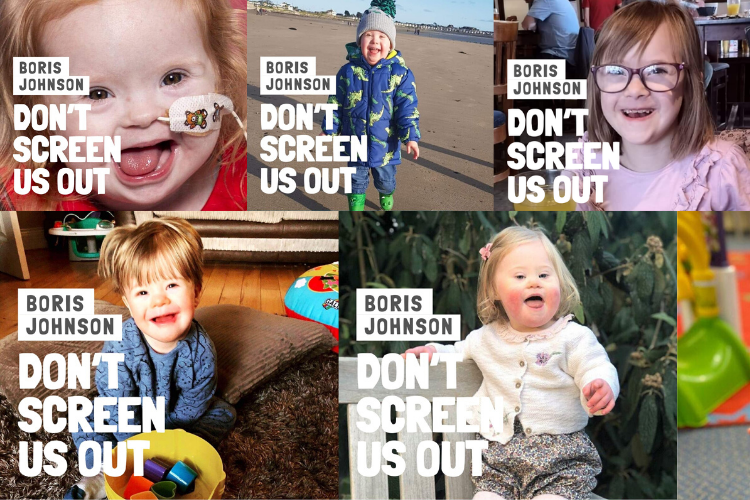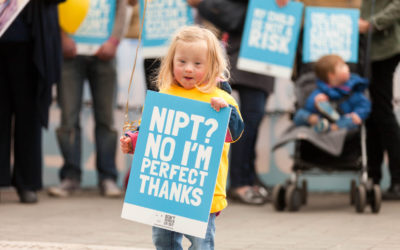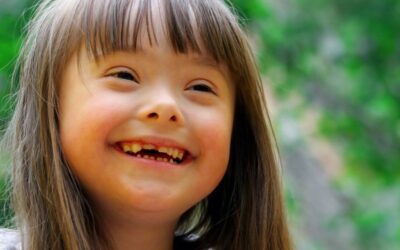2000 people with Down’s syndrome and their families have signed a letter to Boris Johnson urging him to clarify that disability-selective abortion for Down’s syndrome will not be introduced to Northern Ireland.
Don’t Screen Us Out have also now written to the Prime Minister seeking an urgent meeting to discuss concerns with the proposals and have Boris Johnson clarify that disability-selective abortion for Down’s syndrome will not be introduced to Northern Ireland.
The meeting has been sought as Heidi Crowter, a 24-year-old woman from Coventry who has Down’s syndrome, has joined forces with Cheryl Bilsborrow from Preston, whose two year-old son Hector has Down’s syndrome, and have launched a landmark case against the UK Government over the current discriminatory abortion law which allows abortion up to birth for Down’s syndrome.
Dozens of families who have signed the letter have shared photos of their children with Down’s syndrome on social media to help send a strong message to Boris Johnson.
The Government have released a consultation on proposed abortion regulations for Northern Ireland.
The Government are not required by Northern Ireland (Executive Formation etc) Act 2019 to introduce abortion for Down’s syndrome to Northern Ireland. Sadly it appears that the Government are proposing to go further than they are required to do by the Act and have opted to introduce abortion for Down’s syndrome to Northern Ireland in the proposed legal framework.
The consultation document outlines that abortion will be available
- Through to either 12 or 14 weeks on request. This will allow abortion on request for any reason, which will include conditions such as Down’s syndrome. Given the availability of early non-invasive pre-natal screening tests, it will be possible to have a diagnosis for Down’s syndrome followed by an abortion within this period of time.
- Through to either 22 or 24 weeks on ‘mental health’ grounds. This will likely in practice allow for abortion on request for any reason, which will include prenatal conditions such as Down’s syndrome.
- Through to birth for ‘fetal abnormality’ providing that “The fetus if born would suffer a severe impairment, including a mental or physical disability which is likely to significantly limit either the length or quality of the child’s life”.
In England and Wales, the Abortion Act outlines restrictive wording (‘that there is a substantial risk that if the child were born it would suffer from such physical or mental abnormalities as to be seriously handicapped’) which is similar, but in practice this has allowed for abortion for conditions including Down’s syndrome, cleft lip and club foot right through to birth.
So it is likely that under the proposed wording in the framework, without a clear provision stating otherwise, abortion will be available in practice through to birth for Down’s syndrome.
Currently, in Northern Ireland, disability-selective abortion for Down’s syndrome is not allowed and therefore, extremely rare. Figures from the Department of Health in Northern Ireland show that while 52 children with Down’s syndrome were born in 2016, in the same year only one child from Northern Ireland with Down’s syndrome was aborted in England and Wales.
In the rest of the UK, however, the latest statistics show that 90% of babies found to have Down’s syndrome in the womb are aborted and abortion is allowed up to birth if a baby has a congenital condition, including Down’s syndrome.
A recent Freedom of Information request has revealed that 710 late-term abortions (between 20 weeks and birth) for Down’s syndrome have taken place in England and Wales over the last 10 years (2009-2018). The figures are likely to be much higher – a 2013 review showed 886 foetuses were aborted for Down’s syndrome in England and Wales in 2010 but only 482 were reported in Department of Health records. The underreporting was confirmed by a 2014 Department of Health review.
Lord Shinkwin, an advocate for disability equality, has also previously strongly denounced the plans to introduce disability-selective abortion to Northern Ireland, and noted that currently, “Northern Ireland is the safest place in the United Kingdom to be diagnosed with a disability”.
Shinkwin said that changing the law to allow abortion on grounds of disability in Northern Ireland sends a message to the people of Northern Ireland and to the disabled citizens of Northern Ireland that people who are born with a disability “are better off dead.”
Lynn Murray, spokesperson for Don’t Screen Us Out, said:
“We are calling on the Government to urgently clarify that they will not introduce abortion for Down’s syndrome to Northern Ireland. All that is required is for the Government to commit to add a simple provision to the abortion framework that will clearly outline that abortion for Down’s syndrome will explicitly not be allowed.
The Government were not required by Northern Ireland (Executive Formation etc) Act 2019 to introduce abortion for Down’s syndrome to Northern Ireland. Sadly it appears that they have decided to go further than they are required to do by the Act and have opted to introduce abortion for Down’s syndrome to Northern Ireland in their proposed legal framework.
The proposed framework would likely lead to a big increase in abortion for congenital conditions detected pre-birth in Northern Ireland, and would reduce the numbers of our already very small community. This would have a devastating impact on the community of people with Down’s syndrome in Northern Ireland.
Our attitude towards people with disabilities has changed and our laws must reflect that.”
Nicola Woods from Belfast, who has 7-year old son with Down’s syndrome, told the Belfast Telegraph:
“Daniel himself is a delight. He lives in the moment, doesn’t worry about mistakes he made last week or something difficult happening in the future. His joy in the simple things of life has radiated to all those around him.”
People are deluded if they think this won’t have a negative impact on the Down’s syndrome community here in Northern Ireland when it is the safest place to be diagnosed with a disability.
We in Northern Ireland should be left to make our own decisions about abortion law.
People are keen to advocate for equality once babies are born, but not for the unborn child with a disability. Unborn children with disabilities are most vulnerable before they are born, where screening and abortion is the norm. Northern Ireland protects them and we want it to stay that way.”
ENDS
For more information on the Don’t Screen Us Out campaign, see our website www.dontscreenusout.org or email info@dontscreenusout.org
For interviews, contact Don’t Screen Us Out spokesperson Lynn Murray on 0784 0966 736 or email info@dontscreenusout.org
Link to sign the open letter: https://dontscreenusout.org/boris
Past coverage of parents of children with Down’s syndrome speaking out about the law change in Northern Ireland:
https://www.bbc.co.uk/news/uk-northern-ireland-50007000
Full text of Lord Shinkwin’s speech in the House of Lords is available here.
Video of Lord Shinkwin’s speech here.



